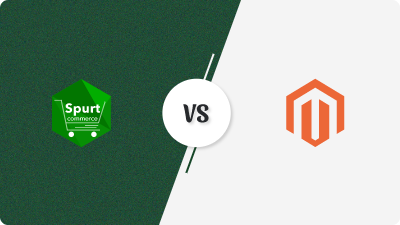COMPARISON
Spurtcommerce vs Magento 2

A Practical Comparison for Modern E-commerce Development
Overview
This comparison highlights Spurtcommerce, a modern headless platform built on Node.js, versus Magento 2, the long-standing PHP-based open-source solution. While both support B2C commerce, they differ in deployment flexibility, customization capabilities, marketplace readiness, and technology choice. The focus is on features that influence purchase decisions and reduce risk..
About Spurtcommerce
Spurtcommerce is a headless, API-driven e-commerce platform built on Node.js and Express.js. It offers both monolithic and microservices deployment options and provides production-ready storefronts in Angular, Next.js (React), and a Flutter mobile app. With built-in multi-vendor suppor , complete with seller panels and commission structure, it supports B2C shopping models out of the box. Spurtcommerce’s enterprise edition includes full access to the source code, including core modules and microservices, enabling complete customization and performance optimization.
Key B2C features include promotions, product variants, SEO tools, multilingual/multi-currency support, and widgets. AddOn-based extensions allow additional functionality—like chat, support ticketing, and supplier management—without altering core code.
About Magento 2
Magento 2 is a robust PHP-based platform that offers a rich set of B2C features such as advanced product catalogs, promotions, inventory tools, and an extensive ecosystem of community and enterprise extensions. It supports multiple stores, languages, and currencies natively.
However, multi-vendor marketplace functionality is not built in. It requires one or more paid extensions from third-party vendors. This approach introduces extra licensing costs,integration work, and technical overhead.
Key Differences – Spurtcommerce vs Magento 2
| Feature/Aspect | SPURTCOMMERCE | Magento 2 |
|---|---|---|
| Architecture | Headless, Express.js-based; supports monolithic or microservices | Modular PHP (Zend), MVC-based |
| Backend Tech | Node.js + Express.js | PHP (Zend Framework) |
| Frontends Provided | Angular, React (Next.js), Flutter storefronts included | Default Knockout.js frontend; PWA Studio plugins available |
| Mobile App | Flutter mobile app provided | Requires separate PWA or mobile app development |
| Multi-vendor Marketplace | Native support: seller panel, commission, vendor onboarding | Requires third-party extensions |
| Seller/Admin Panels | Both admin and seller dashboards included | Admin included; seller panels via extensions |
| Source Code Access | Full access to source code in enterprise version | Backend source open; marketplace features locked behind paid extensions |
| Customization Ease | High, thanks to Node.js ecosystem and full code control | Flexible, but PHP/XML and extension integration can be complex |
| Performance & Hosting | Lightweight setup that scales easily with modern stack | Requires robust hosting and performance tuning |
| Time to Market | Fast, since B2C + marketplace support is available out of the box | Slower, as marketplace requires extra extensions and integration work |
Spurtcommerce is ideal for:
- B2C businesses launched with multi-vendor marketplace capabilities out of the box
- Development teams using JavaScript stacks—familiarity with Express.js, React, or Angular
- Organizations seeking source code control and easy deployment flexibility
- Projects needing fast time-to-market without sacrificing customization
- Teams wanting mobile apps and multilingual/multi-currency storefronts
Magento 2 is ideal for:
- Businesses already invested in PHP or Magento ecosystem
- Projects needing deep B2C feature richness with tailored extensions
- Enterprises using official Magento or AdobE-commerce cloud
- Teams prepared for the cost and effort to integrate multi-vendor marketplace extensions
Conclusion
Magento 2 offers powerful B2C capabilities and a large ecosystem, but lacks native support for multi-vendor functionality. It also demands deeper PHP expertise, especially when adding marketplace extensions.Spurtcommerce, in contrast, stands out as a modern, API-first headless platform with built-in multi-vendor marketplace support, modern frontend and mobile experiences, lightweight deployment, and complete source code access.
For teams aiming to launch or manage a marketplace-first, JavaScript-based solution with full customization options, Spurtcommerce offers a compelling, future-proof alternative to Magento 2.



 En
En Es
Es Ar
Ar